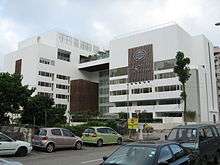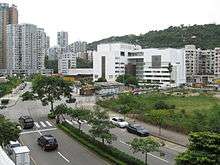School of the Nations (Bahá'í – Macau)
| School of the Nations 澳門聯國學校 | |
|---|---|
 School of the Nations, Macau SAR | |
| Location | |
|
Rua Do Minho, Taipa Macau | |
| Information | |
| Type | International School |
| Established | 1988 |
| Administrator | Vivek V. Nair |
| Staff | 100+ |
| Grades | Kindergarten to Upper Secondary (Form 6/Grade 12) |
| Number of students | 600-700 |
| Colour(s) | |
| Website |
www |
The School of the Nations (Traditional Chinese: 聯國學校; Simplified Chinese: 联国学校; Jyutping (Cantonese): lyun4 gwok3 hok6 haau6; Pinyin (Mandarin): lián guó xué xiào) is a Bahá'í-inspired school in Taipa, Macau. It is owned by the Badi Foundation. In 1988, as the result of the efforts of a number of Macau residents and the Government of Macau, the School was established. As an international school, it provides an internationally oriented English-medium educational program for both expatriate and local families. The school currently has approximately 600-700 pupils, of whom about 70% are from Macau while the remaining 30% represent approximately 35 different nationalities. The parents of these expatriate students, for the most part, are in Macau for employment, working in Macau's private and public sectors.

History
The School of the Nations is an internationally oriented educational institution, licensed by the Government of Macau, as a non-profit organization. It originally opened in 1988 with 5 students, all of whom were enrolled in kindergarten. It came about as a result of efforts from a number of Macau residents who saw the need in the community for an English medium school. By the end of the 1989-1990 school year, the original premises in the Seng Vo building were filled to capacity. The demand for new enrollments however, continued to rise. It was decided to acquire additional property on the fourth floor of the Lei San building as an interim measure while a more permanent solution was sought. These premises were occupied for the school year 1990-1991 allowing the school to enroll approximately 200 students (a 100% increase over the preceding year). A 35% increase for the academic year 1991-1992 and a 29% increase for the 1992-1993 school year brought the school to a critical condition of overcrowding. To accommodate the influx of new students, in 1994 the school began to lease commercial properties and convert them to classrooms.
In 1997 all of Asia experienced a severe economic downturn, and enrollments at the school dropped. The decision was made to return all leased property, reduce overhead and limit enrollment to the number of students that could be accommodated in the properties belonging to the school. From that period until 2008, the school maintained a steady population of about 260 students.
In 2008, construction of the School of the Nations building was completed. The building is located on Rua de Minho, on Taipa Island, not far from the Nova City residential complex. This new facility has greatly increased the school's capacity, allowing for a major increase in student capacity. Since then, the school has grown to approximately 600-700 students with around 100 staff.
Facilities
As a result of Macau's limited amount of land, the school was initially located in rented properties within residential buildings. Normal classes were held in modified apartments. Physical education and other outdoor activities were carried out in the nearby facilities of a government school as well as public facilities where the School had access to basketball and mini-soccer courts and swimming pools, while space in the Macau Cultural Center was used for school gatherings.
In 2006, Macau's Education Department gave the school a grant of 2,500 square metres of land on Taipa Island, as well as substantial financial support for the construction of the new campus.[1] The present school building is located on these grounds.
The current school campus spans 7 floors. The ground floor is home to the school's library and some of the kindergarten classrooms, while the 1st floor is home to the cafeteria and the remaining kindergarten classrooms. The 2nd, 3rd, and 4th floor feature mostly classrooms, with the 2nd floor being used for primary school, the 3rd for middle school, and the 4th for secondary school (see below for information on sectioning of grades). The 3rd floor is also home to the arts wing of the school, featuring two art rooms, two drama studios, and a music studio, while the 4th floor features a large auditorium capable of seating approximately 500 people. The campus also features science laboratories and computer labs equipped with state-of-the-art equipment and supplies on both the 3rd and 4th floors. The 5th floor houses the school's gymnasium, while the 6th and 7th floors (Roof and Upper Roof) are outdoor activity areas used for sports and play. The administrative offices are spread across the ground, 1st, 2nd, 3rd and 4th floors.
Curriculum
Character development, a spirit of social service and cooperation, including environmental awareness[2] is a strong theme in the educational program of SON.[1] Despite retaining a 2-section naming system ("Primary" and "Form" aka Secondary) the school uses a 3-section system to divide its grades internally - primary school, middle school and secondary school.
Its current standard curriculum for the lower grades (up to Form 2 aka Grade 8) consists of:[3]
- English
- Mandarin
- English Literature
- History
- Computer Science
- Geography
- Combined Science (integrating Biology, Chemistry and Physics)
- Mathematics
- Physical Education
- Art
- Drama
The character training program was awarded first prize in 1997 for innovation in curriculum by the Department of Education and Youth Services of Macau. It was also awarded 3rd prize by the International Schools Services in their worldwide competition for community service programs.[3]
I.G.C.S.E. Programme
The International General Certificate of Secondary Education (IGCSE) is a English language curriculum offered to secondary students to prepare them for the International Baccalaureate, A Level and BTEC Level 3 curriculums. It is based on the GCE O-Level and is recognized internationally as being equivalent to the British GCSE. Students begin studying the courses in Form 3 (Grade 9) and generally take the examinations at the end of the school year in Form 4 (Grade 10) - however, higher-achieving students in the English and Mathematics courses are permitted to take the examinations in said courses 1 year early (at the end of Form 3). School of the Nations currently offers courses in the following subjects for the IGCSE Exams:
- Biology - 0610
- Physics - 0625
- Chemistry - 0620
- English - First Language - 0500
- Chinese (Mandarin) - Foreign Language - 0547
- English - Literature - 0486
- Global Perspectives - 0457
- Information and Communication Technology - 0417
- Computer Science - 0478
- Mathematics - 0580
- Additional Mathematics - 0606
- Drama - 0411
NOTE: The Information and Computer Technology course is being phased out in favor of the Computer Science course, starting with the 2016-2017 Form 3 students. The 2016-2017 Form 4 (Grade 10) students will be the last group of students to take the Information and Communication Technology course examination.
The School of the Nations is currently the only school to offer the Drama and Computer Science courses in Macau. The average grade achieved by a secondary student studying in the IGCSE program in SON is an A; most students achieve several A/A* grades in their IGCSE examinations.
I.B. Diploma Programme
The International Baccalaureate Diploma Programme (IBDP) is a two-year educational programme primarily aimed at students aged 16–19. It is taken by students starting from Form 5 (Grade 11) and ending in Form 6 (Grade 12) with the examinations. The program provides an internationally accepted qualification for entry into higher education and is recognised worldwide. The School of the Nations is currently the only school in Macau to offer the IB Diploma programme as a part of its curriculum. The School of the Nations offer the following subjects for the IB Diploma Programme.
- Theory of Knowledge (TOK)
- Creativity, Activity, Service (CAS)
- English A HL/SL
- Business & Management HL/SL
- Chemistry HL/SL
- Biology HL/SL
- Physics HL/SL
- Mathematics HL/SL
- Mathematics Studies SL
- ITGS HL/SL
- Chinese B HL
- Mandarin Ab. SL
- Psychology HL/SL
- Economics HL/SL
- Spanish Ab. SL
- French Ab. SL
- Visual Arts HL/SL
- Film Studies HL/SL
Scholarships
The school offers a scholarship to students who are in financial need and who have consistently and diligently demonstrated high academic merit. Scholarship recipients must also be noted for their cooperative behaviour, friendliness, helpfulness, respect for teachers and fellow students, and obedience to school rules. The scholarship is funded through ongoing fundraising efforts within the school.
References
- 1 2 School of the Nations, Macau, receives land grant from government Taipa, Macau 6 July 2006 (BWNS)
- ↑ Atlas of Student Action for the Planet UN.org Cyberschoolbus
- 1 2 The Educational program of the School